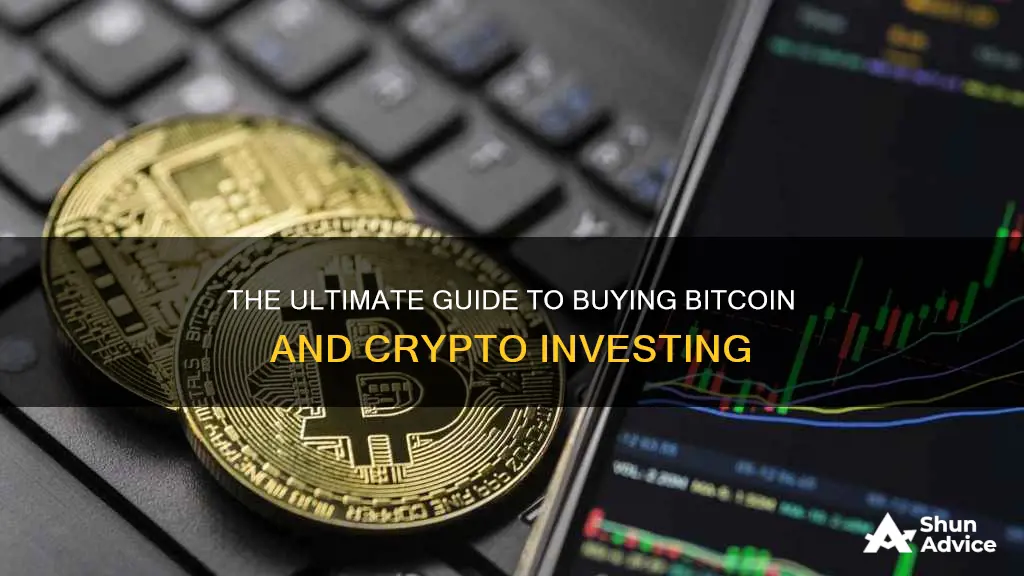
Bitcoin is a decentralised digital currency that operates without the oversight of banks and governments. It is bought and sold on cryptocurrency exchanges, such as Coinbase, Binance, and Gemini, or through brokers, such as Robinhood and SoFi.
Before investing in Bitcoin, it is important to understand the risks. Cryptocurrency is a volatile asset class, and Bitcoin has experienced both impressive gains and devastating declines. It is generally recommended that cryptocurrencies make up no more than 5% of an investor's portfolio.
To buy Bitcoin, you will need to:
1. Choose a broker or crypto exchange
2. Create and verify your account
3. Deposit cash to invest
4. Place your cryptocurrency order
5. Select a storage method
| Characteristics | Values |
|---|---|
| How to buy Bitcoin | Buy from a crypto exchange or a broker |
| Crypto exchange examples | Coinbase, Gemini, Binance, Kraken |
| Crypto broker examples | Robinhood, SoFi |
| Account requirements | Personal information, identity verification |
| Funding methods | Bank account, wire transfer, debit/credit card |
| Storage methods | Hot wallet, cold wallet, exchange wallet, hardware wallet |
| Risks | Volatility, fraud, hacking, lack of regulation |
What You'll Learn

Choosing a crypto-trading service or venue
There are several options for crypto-trading services or venues, each with its own advantages and disadvantages. Here are some factors to consider when making your decision:
- Reputation and security: Opt for a reputable, well-known exchange with strong security measures in place to protect your investments.
- Fees: Different exchanges charge different fees for trading and transactions. Compare the fees across exchanges before making your choice.
- Ease of use: Some exchanges may have complex interfaces that can be intimidating for beginners. Look for user-friendly platforms that offer easy purchase options.
- Fiat currency support: Ensure that the exchange allows fiat currency transfers and purchases with US dollars or other supported fiat currencies.
- Cryptocurrency selection: Consider the range of cryptocurrencies available on the exchange. If you're interested in investing in specific coins, make sure the exchange offers those options.
- Volume of trading: Choose an exchange with a high volume of trading to ensure liquidity and better pricing.
- Minimum investment requirements: Different exchanges have varying minimum investment requirements. Select one that aligns with your budget and investment goals.
- Regulation and compliance: Verify that the exchange meets regulatory requirements and complies with know-your-customer (KYC) and anti-money laundering (AML) standards.
- Customer support: Look for an exchange that provides responsive and reliable customer support to assist you with any issues or queries.
Some popular cryptocurrency exchanges include Coinbase, Gemini, Kraken, Binance, and Crypto.com. These exchanges offer a wide range of cryptocurrencies, user-friendly interfaces, and varying fee structures. It's important to research each exchange thoroughly, considering factors such as security, fees, and the range of cryptocurrencies offered before making your decision.
The Partial Bitcoin Investment Guide for Beginners
You may want to see also

Connecting your exchange to a payment option
At most exchanges, you can connect your bank account directly or link it to a debit or credit card. Although you can use a credit card to purchase cryptocurrency, the volatility of cryptocurrency prices could increase the overall cost of purchasing a token when combined with a credit card's interest charges. Bitcoin is legal in the U.S., but some banks may question or even stop deposits to crypto-related sites or exchanges.
Fees vary for deposits via a bank account, debit, or credit card, and exchanges also charge fees per transaction. For example, using a credit card to buy cryptocurrency often incurs high transaction fees and is generally not recommended. Additionally, credit card companies treat these transactions as cash advances, resulting in higher interest rates.
It is important to note that while you can use a credit card to fund your account, it is generally advised to pay for cryptocurrency purchases with cash or another cryptocurrency to avoid the high fees associated with credit card transactions.
When choosing a payment option, it is also essential to consider the security and privacy of your information. Privacy and security are crucial aspects of the Bitcoin world, and it is recommended to keep private keys, which authorise transactions, secret.
Strategizing Your Bitcoin Mine Investment: A Comprehensive Guide
You may want to see also

Placing an order
Once you have chosen a broker or crypto exchange, you can sign up and create an account. Depending on the platform and the amount you plan to buy, you may have to verify your identity. This is a crucial step to prevent fraud and meet federal regulatory requirements. You may be asked to submit a copy of your driver's license or passport, and even a selfie to prove your identity.
After your account is set up, you will need to fund it. You can deposit money into your crypto account by linking your bank account, authorising a wire transfer, or even making a payment with a debit or credit card.
Now that there is money in your account, you are ready to place your first cryptocurrency order. There are hundreds of cryptocurrencies to choose from, ranging from well-known names like Bitcoin and Ethereum to more obscure cryptos like Theta Fuel or Holo.
When deciding on which cryptocurrency to purchase, you can enter its ticker symbol—for example, Bitcoin's ticker symbol is BTC—and how many coins you would like to purchase. With most exchanges and brokers, you can purchase fractional shares of cryptocurrency, allowing you to buy a sliver of high-priced tokens like Bitcoin or Ethereum.
After you have decided on the cryptocurrency and the amount you want to purchase, you can submit and complete your first buy order for one or more cryptocurrencies.
Bitcoin or Ethereum: Where to Invest Now?
You may want to see also

Safe storage
There are several types of wallets available for storing your cryptocurrency:
- Hardware wallets are physical devices that store your private keys offline and keep them under your control. They are considered the gold standard for storing large amounts of cryptocurrency over an extended period. While they can be expensive, they offer superior security against online theft. Examples include Ledger Nano X and Trezor Model T.
- Hot wallets are software wallets that store cryptographic keys on internet-connected devices such as computers or smartphones. They are ideal for regular transactions and daily use but are vulnerable to cyberattacks. Examples include Guarda and Mycelium.
- Cold wallets are offline wallets that are not connected to the internet and are considered the most secure option for long-term storage. They can be paper wallets or hardware wallets. Paper wallets are less user-friendly and more susceptible to physical damage or loss, but they eliminate the risk of online hacking.
- Custodial wallets are managed by a third party, such as an exchange, that stores your private keys for you. While they are convenient, they lack total control over your private keys and are vulnerable to hacks and theft.
- Non-custodial wallets give users full ownership of their private keys.
- Exchange wallets are provided by the exchange where you purchase your crypto. They are convenient, as they require little to no setup, but they are less secure, as the exchange holds your private keys.
When choosing a storage option, consider the following:
- The amount of cryptocurrency you hold: Cold storage is generally recommended for large amounts, while hot wallets may be more convenient for smaller amounts or daily trading.
- How long you plan to hold your crypto: Short-term holders may prefer the convenience of hot wallets, while long-term investors may opt for the enhanced security of cold wallets.
- Security: Evaluate features like two-factor authentication, multi-signature wallets, and the reputation of service providers.
- Your technical expertise and comfort level with cryptocurrency technology: New users may prefer user-friendly platforms with intuitive interfaces and helpful customer support.
- Liquidity: Hot wallets and some exchanges offer high liquidity but at the expense of lower security.
- Backups: Choose solutions that offer secure backup options to prevent loss of access to your wallet.
- Cryptocurrencies supported: Ensure that the storage option you choose can store the specific types of crypto you have.
To protect your cryptocurrency, it is recommended to use a combination of hot and cold wallets or multiple wallets for different purposes. For example, you could use a hardware wallet for long-term cold storage, a mobile self-custody wallet for spending and transacting, and an exchange wallet for trading niche crypto coins. Additionally, always enable two-factor authentication and use strong, unique passwords for your wallets.
The Best Time to Invest in Bitcoin Cash
You may want to see also

Understanding the risks
Before investing in Bitcoin, it is important to understand the risks involved. Here are some critical risks to consider:
Price Volatility and Manipulation
The cryptocurrency market, including Bitcoin, has experienced significant volatility, with wild swings, scams, and unprecedented gains and losses. This volatility is driven by market sentiment, speculation, and manipulation. The unregulated and anonymous nature of the market makes it susceptible to price manipulation by crypto exchanges, media owners, and influential investors.
Regulatory Uncertainty
The lack of clear regulatory frameworks around cryptocurrencies creates uncertainty for investors. There are concerns about future restrictions or bans on cryptocurrencies, as well as complex and inconsistent tax treatments across different jurisdictions.
Security and Custody
Storing cryptocurrencies securely is a significant challenge. There have been incidents of theft and hacking, and investors may not be able to recover lost or stolen assets. Cryptocurrencies also lack the official safeguards and insurance typically provided by traditional financial institutions.
Technical and Human Errors
The cryptocurrency market is susceptible to technical glitches and human errors, which can lead to losses.
Peer-to-Peer Transactions
Digital currencies can be traded on unregulated online platforms, exposing investors to risks such as double-selling and a lack of consumer protection.
Trading Platform Risks
Digital currency trading platforms are largely unregulated and provide limited transparency. They have been associated with cases of fraud, business failure, and security breaches, leaving investors vulnerable to losses.
Loss of Confidence and Value
Cryptocurrencies are not backed by central banks or other traditional financial institutions, and their value is solely determined by market participants. A loss of confidence in digital currencies could lead to a collapse in trading activities and a sharp drop in value.
Country-Specific Restrictions
Certain countries may impose restrictions on the acquisition, ownership, or use of digital currencies, impacting the ability of investors to access and trade cryptocurrencies.
Taxation
The tax treatment of cryptocurrencies varies across jurisdictions, and the lack of clear regulations makes it challenging for investors to understand their tax obligations and record-keeping requirements.
Network Slow-Down
The blockchain network may experience slowdowns due to high transaction volumes or insufficient rewards for block validations, impacting the speed of transactions.
Forks in the Blockchain
Dissent among users regarding protocols can result in a "fork," creating two separate networks and versions of the cryptocurrency. This can lead to price volatility and impact the value of the original cryptocurrency.
It is essential for investors to carefully consider these risks and conduct thorough research before investing in Bitcoin or any other cryptocurrency. Diversification and seeking professional financial advice can also help mitigate some of these risks.
Bitcoin: Currency or Investment?
You may want to see also
Frequently asked questions
Bitcoin is a risky and volatile investment, so approach it with caution. It's largely unregulated, and there are many unknowns about how this new form of currency will develop in the future.
Never invest more than you can afford to lose. It's recommended to hold no more than 2% of your overall portfolio in any one cryptocurrency to limit crypto-specific risks.
You can buy Bitcoin through a cryptocurrency exchange or a broker. Exchanges tend to have lower fees but more complex interfaces, while brokers take the complexity out of purchasing crypto but often charge higher fees.
You can store your Bitcoin in a "hot wallet" or a "cold wallet". A hot wallet is connected to the internet and is generally more convenient, while a cold wallet is offline and considered more secure.
The price of Bitcoin is extremely volatile, and it can fluctuate widely. Along with impressive gains, there have also been devastating declines.







